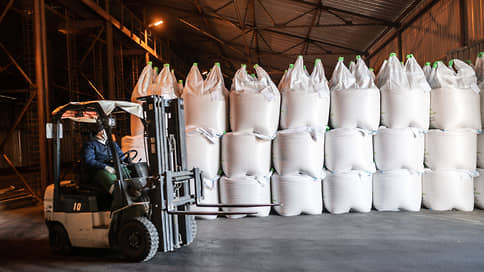Fertilizers are looking for a way out of the Sea of \u200b\u200bAzov
[ad_1]

Shippers of fertilizers in soft containers (big bags), who were banned in March from transporting them through the Kerch Strait, with the help of business ombudsman Boris Titov, are asking the Ministry of Transport to allow them to send non-explosive cargo through the ports of Azov by the same route. We are talking about 3.5-4 million tons of mainly Russian and Belarusian fertilizers. Reorientation to Novorossiysk is impossible due to the busyness of the direction. The Ministry of Transport supported the proposal subject to increased security measures. Analysts believe that the situation in the Black Sea ports will not change for the better yet, so alternative routes need to be revived.
The Ministry of Transport supported the proposal of business ombudsman Boris Titov to resume the passage of ships with cargo packed in big bags (soft containers) through the Kerch Strait, subject to a number of conditions (Kommersant has the letter). The Ministry of Transport declined to comment.
Mr. Titov applied to the Ministry of Transport at the end of July. He noted that the March ban on the passage of goods in a universal flexible container through the Kerch Strait was introduced without consultation with the business community and “not entirely justified.” The ban was introduced after the restoration of the Crimean bridge after a truck was blown up in October 2022. In July, the Crimean Bridge was attacked again, this time by surface drones, and its road section was damaged.
The main export cargo in big bags is Russian and Belarusian fertilizers. Sources of Kommersant among fertilizer producers said that about 10% of Russian exports, or about 3.5 million tons, go in this direction.
Alexander Konovalenko, general director of TransServiceTerminal-South, the organization that turned to Mr. Titov, explained to Kommersant that the annual volume of cargo in big bags, which were subject to the ban, is about 3.7 million tons. In addition to non-explosive fertilizers of the urea, ammophos group (manufacturers – Eurochem, Uralkali, Belaruskali, Grodnoazot, Russian Hydrogen and others), food soda ash, caustic soda, rubber, copper sulfate (“Russian hydrogen”), propylenes of various types (SIBUR, LUKOIL), pellets, products of the timber industry complex, ferruginous quartzites and concentrates (“KMAruda Plant”), thermal anthracites, marble chips, sludge and other cargoes.
Now, Mr. Konovalenko specified, due to the ban, it is impossible to ship the products of Grodnoazot, Russian Hydrogen in Armyansk, which has a batch of ammophos, Bashkir Soda, SIBUR with polypropylene chips, Belaruskali, working through the forwarder Beltamozhservice. Some of that cargo has been diverted to Novorossiysk, he says, but the infrastructure there is limited.
Mr. Titov notes that the market for mineral fertilizers has fallen by 35%, factories cannot sell their products due to an oversupply in the domestic market and the lack of export shipments. “The terminals of the Novorossiysk Sea Port (NCSP) cannot take on this volume of mineral fertilizers,” he writes.
On the issue of transportation to Novorossiysk, JSC Russian Railways reported that now “there are no conventional restrictions on container cargo in communication with NCSP”, adding that they record an increased demand for cargo transportation in this direction, in addition, it carries out a record volume of passenger traffic on against the backdrop of air traffic restrictions.
“Under these conditions, in order to ensure normal rhythmic work, the company asks consignors and consignees to take a responsible approach to planning transportation and fulfilling their obligations,” Russian Railways stressed.
To solve the problem with the Kerch Strait, Mr. Titov proposes to consider the possibility of allowing the transportation of goods in big bags, taking into account the observance of increased security measures, namely, the packaging of non-hazardous mineral fertilizers (urea, ammophos, etc.) in a soft container on the territory of the ports of the Azov basin in the zone customs and border control and delivery of cargo to the port using transport security authorities. And the ban on the transportation of ammonium nitrate is proposed to be maintained. In response, the Ministry of Transport writes that it supports the proposal for packing in big bags in the customs control zone in the ports of Azov and that it should be carried out, like loading onto a ship, in the presence and under the control of transport security units. The Ministry of Transport sent the materials to the FSB and, upon receipt of a response from there, will give an answer on the merits of the questions posed.
The head of Infoline-Analytics Mikhail Burmistrov notes that approaches to the ports of the south and, in particular, Novorossiysk in 2023 are critically overloaded and no improvement is expected. In this regard, it is advisable to unblock supply channels as soon as possible, ensuring the supply of non-explosive cargo through the Kerch Strait. In the future, the expert believes, taking into account the fact that the high degree of the terrorist threat will persist for a long time, Russia needs to think about a long-term model for ensuring the safety of cargo flows, including by strengthening hardware and telemetry control, avoiding excesses that block the transportation of significant volumes of cargo . Also, in his opinion, it is necessary to separately work out the issues of reducing risks in the transportation of explosive goods, such as ammonium nitrate.
[ad_2]
Source link





